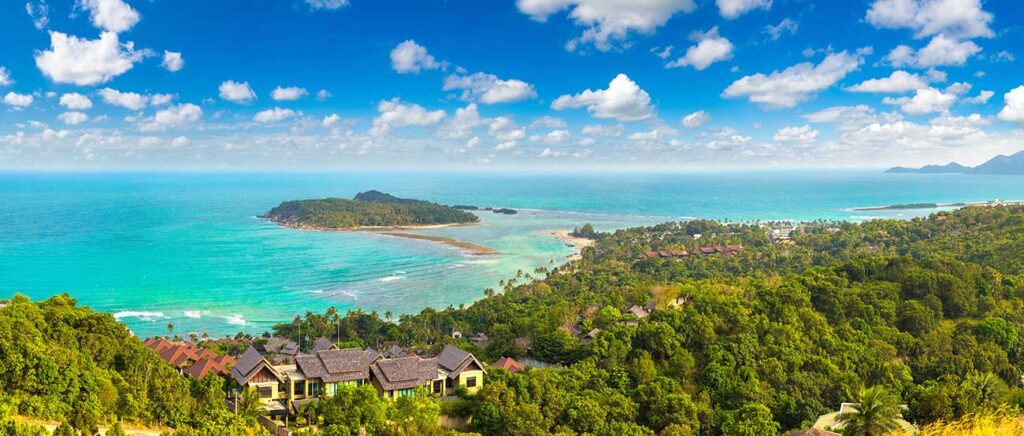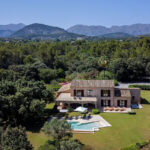Over the last 15 years, Koh Samui has evolved into one of Thailand’s most desirable resort destinations. With international schools, private hospitals, and a wide range of beachside developments, the island has become increasingly attractive to both tourists and real estate investors.
In this article, we explore the growing trend in the types of tenure offered by developers for Koh Samui villas for sale, with a noticeable shift away from freehold corporate structures toward leasehold, driven by stricter enforcement of existing laws introduced by the government in 2024
Foreign Ownership Rules Regarding Freehold Land in Thailand
Foreign nationals are not allowed to own freehold land in Thailand. This applies across the country, including Koh Samui. However, foreigners can legally own the buildings on land, which has led to two commonly used legal structures:
Leasehold Ownership:
Foreigners can lease land for up to 30 years. Some projects advertise renewable lease periods (30, 30, 30), but renewals depend entirely on the landowner. In practice, extensions are rarely guaranteed in villa developments. Courts in Thailand have not firmly established enforceability of lease renewals, so buyers are increasingly opting for clearly defined, single-term 30-year leasehold agreements, especially in the lower price ranges.
Thai Company Ownership:
Another method historically used is setting up a Thai limited company to hold the land title. This structure requires majority Thai ownership (minimum 51%) and the company must operate as a genuine business. In the past, many companies were set up with nominee shareholders, something that has come under scrutiny.
Government Crackdown: Stricter Enforcement, Not New Laws
It’s important to note that the law itself hasn’t changed. What has changed is how strictly it is being enforced. Starting in 2024, the Thai government began taking more visible action, especially in resort areas. The most high-profile example was Operation Nominee Swoop in Phuket, which resulted in dozens of arrests and the seizure of significant assets. While this operation was focused on Phuket, similar scrutiny has extended to Koh Samui and other resort destinations across the country.
The enforcement is aimed at ensuring company structures are legitimate and not simply vehicles for foreign land ownership using nominee shareholders.
Market Shift: Rise of Leasehold Villas in Koh Samui
In response, developers in Koh Samui have adjusted the ownership structures of the projects they bring to market. Previously, the vast majority of villa and house developments, across all price brackets including the entry-level to mid-range segment, were offered as freehold through a Thai company structure. Leasehold villas were the exception.
That began to change in 2024. As the risks, complexity, and cost of using corporate structures became more apparent, developers began offering a growing number of leasehold villa projects, particularly in the THB 5M to 12M range. At these price points, the added legal and administrative burden of setting up a properly compliant Thai company becomes prohibitive in the eyes of many investors. However, in the mid to high-end segment, fully compliant company ownership structures remain a viable and commonly used option.
This is a clear and measurable change in market behaviour. Leasehold villas now make up a significant portion of listings in this price bracket. They are easier to purchase, require no company formation, and avoid legal ambiguity.
For buyers in this range, the shorter tenure is often accepted in exchange for simplicity, cost savings, and greater legal clarity. While some projects do offer renewable lease terms, many are structured as a straightforward 30-year lease. In those cases, the pricing is typically adjusted to reflect the limited tenure, making the properties more attractive to investors focused on ease of purchase and legal compliance.
Mid to High-End Market Still Uses Company Ownership
At the higher price points, freehold villa projects still dominate the market, but investors must ensure a fully compliant corporate structure. This means a Thai company that is actively trading, generating rental income, filing taxes, and distributing dividends. A company holding structure is more complex and expensive to maintain than leasehold, but many foreign investors still prefer it for higher-value properties where longer-term ownership is paramount.
Why This Shift Hasn’t Happened in Phuket
It’s also worth noting that the same shift in ownership structures has not occurred in Phuket. The reason for this is simple: in Phuket, there is a large supply of freehold condominiums in the lower to mid-price ranges. These offer an alternative legal structure for foreign buyers who want to avoid the complexities of company ownership, and so there has been less pressure to introduce leasehold villa developments.
In contrast, Koh Samui has very few freehold condominium projects available, mainly due to zoning regulations. The island’s real estate market has traditionally been dominated by villas and leasehold apartments. The only major freehold condominium project launched in 2024 was Anava Koh Samui, located on Ban Rak Beach.
Limited Condominium Supply in Koh Samui
Because of this limited condo supply, leasehold villas have become the most practical alternative for foreign investors looking for a legal and straightforward route to property ownership in Samui. While leasehold does have its limitations, it removes the burden of setting up and maintaining a Thai company and offers a simpler, lower-cost pathway to ownership.
A Clear Trend, Driven by Practical Realities
The change in ownership structure isn’t based on new laws, it’s based on how the existing laws are being enforced. Developers have responded accordingly, especially in the mid- and lower-end segments of the market.
Leasehold villas, once rare, are now common in Koh Samui’s residential property market. This trend is likely to continue as buyers look for straightforward, compliant ownership options that don’t involve complex company structures.
For those who still prefer freehold land, the only viable path remains a properly established and active Thai company, something best suited to higher-value investments.
Read more analysis about the property market in Koh Samui



